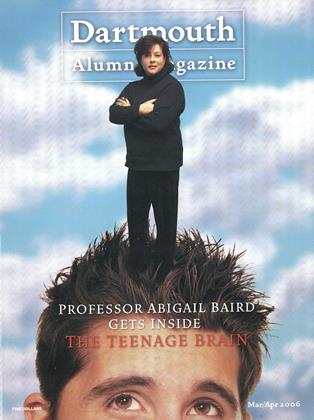As DARTMOUTH'S FIRST SUSTAINABILITY director Jim Merkel is an advocate for highly efficient buildings that produce their own energy.
As is evident from his Parkhurst office decor, he pays attention to the small stuff, too. Merkel, who started work in June, has discovered a windfall of discarded materials around campus. "I got this wicker basket from the student throw-out, that basket over there was thrown out," says Merkel as he gestures around. "This ream of paper was thrown out, the printer and these art supplies, still in the wrappers, were all thrown away." (His office inventory doesn't include the unopened groceries, including organic oil, he retrieved and brought home.)
As a member of Dartmouth's administrative team, Merkel uses his post as a bully pulpit. His message: Dartmouth and our society are not sustainable; we consume resources faster than they regenerate. Merkel wants the College to understand the concept of "cradle to cradle," those ideas outlined in the book by the same title by William McDonough '73. McDonough proposes that society create products and processes that eliminate waste and pollution.
Originally an engineer working on military projects, Merkel left the profession after the 1989 Exxon Valdez oil spill to devote himself to environmental projects. Along the way he used his training as an engineer to develop a philosophy and method to calculate ones impact on the environment. And it is from that mindset he hopes to make the Big Green greener. "Students have awareness and don't know how to act on it," he says. "We have to make it easier for students to be sustainable before we bellyache at themfor being irresponsible little kids."
Among the first projects Merkel hopes to tackle is student dining, in particular the use of disposable plates, cups and plastic flatware. "You need to have a cafeteria where students don't need to generate qgarbage. No one came to them and said, 'Do you want a plate?' We just give them garbage."
Where would Merkel start? "Give every student one of those Dartmouth mugs and get rid of all those beverage bottles currently sold at places such as Collis. If you forget your mug and have to go back to your room, tomorrow you remember it," says Merkel. "A little tough love like that would go a long way, and it would put Dartmouth on the map as a campus that doesn't generate garbage. As adults we have to go the extra yard and trust and believe that the students are going to take on this sustainability."
Details about how to build a sustainable society can be found in Merkel s book Radical Simplicity or on the Web site for the Global Living Project, www.globalliving project.org.
Don't Know Much About:Global Warming?
 View Full Issue
View Full Issue
More From This Issue
-
 Feature
Feature“D” is for Denial
March | April 2006 By PETER JAQUITH ’58 -
 Cover Story
Cover StoryMind Matters
March | April 2006 By Irene M. Wielawski -
 Feature
FeatureNotebook
March | April 2006 By THOMAS AMES JR. '74 -
 Feature
FeatureAlumni News
March | April 2006 By Paul Stone '60 -
 PERSONAL HISTORY
PERSONAL HISTORYThe Stages of Life
March | April 2006 By Nell Shanahan ’99 -
 Sports
SportsThree Times a Coach
March | April 2006 By Brad Parks ’96
Lee Michaelides
-
 Article
ArticleThe Professor
SEPTEMBER 1987 By Lee Michaelides -
 Feature
FeatureBad Things You Learned in Gym
OCTOBER • 1987 By Lee Michaelides -
 Feature
FeatureForged by Flame
Nov/Dec 2005 By LEE MICHAELIDES -
 Interview
InterviewQ & A
May/June 2007 By Lee Michaelides -
 Article
ArticleWhat's New
July/Aug 2010 By Lee Michaelides -
 Article
ArticleWhat’s New
Jan/Feb 2012 By Lee Michaelides







